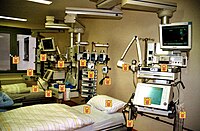
Photo from wikipedia
Introduction/Hypothesis: The rate of Pediatric Intensive Care Unit (PICU) acquired complications (PACs) such as delirium, iatrogenic withdrawal and weakness is rising in critically ill children. This is a result of… Click to show full abstract
Introduction/Hypothesis: The rate of Pediatric Intensive Care Unit (PICU) acquired complications (PACs) such as delirium, iatrogenic withdrawal and weakness is rising in critically ill children. This is a result of a practice paradigm of excessive sedation and immobilization, and the lack of pediatric evidence-based guidelines for managing and preventing PACs in this population.In this study we will implement an early rehabilitation bundle to prevent PACs at 2 tertiary care PICUs at McMaster Children’s Hospital and London Health Sciences. Methods: We used Pronovost’s 4 E’s Framework to implement the “PICULiber8 Bundle”. The Bundle consists of evidence-based practices to reduce sedatives, prevent withdrawal, manage delirium, optimize sleep, implement early mobilization, and engage families in the process. Engagement consisted of a pre-implementation survey to understand knowledge and practice preferences, followed by focus groups interviews. A Bundle Development and Bundle Implementation teams were developed to create an evidence-based guideline and develop a systematic plan for the education and execution phase. A Delphi process was used by each team to develop consensus on bundle content and implementation. Evaluation will consist of assessing the impact of the bundle on the process of care, family satisfaction, clinical and patient-centered outcomes, and the cost of implementation using mixed methods and run chart analyses. Results: Engagement was conducted in 3-months. Key knowledge gaps were identified: awareness of delirium, under appreciation of PACs, lack of consistency in measurement and practice variations with respect to sedation and goals in intubated children. Engagement data demonstrated the need for goal directed, evidence based and user-friendly guidelines, more consistency in approach to sedation amongst attending staff, and better team communication. Evidence-based Bundles were developed over a 4-month and an educational roll out plan was developed over the subsequent 3 months. Sequential roll-out of the guidelines were implemented over 2-months. Conclusions: It is feasible to implement an early rehabilitation bundle over a 10-month period in 2 sites using a clear implementation framework. Ongoing evaluation will measure the uptake of the bundle and its impact on process of care and patient outcomes.
Journal Title: Critical Care Medicine
Year Published: 2020
Link to full text (if available)
Share on Social Media: Sign Up to like & get
recommendations!